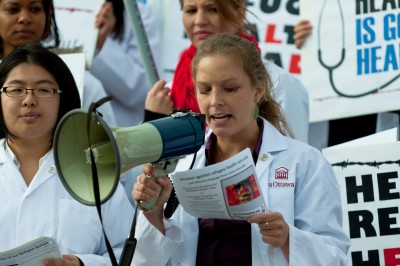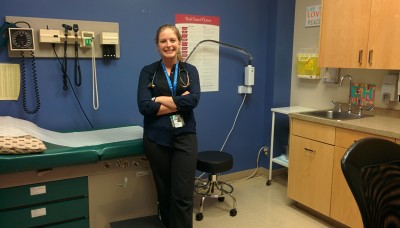Fourth-Year Medical Student
University of Ottawa
 |
I chose the Humanities and Biology program at Carleton University because, coming out of high school, I couldn’t decide if I wanted to pursue the liberal arts or sciences. I saw the Hums and Bio program as the opportunity to do both. As a bonus, I would have the opportunity to read primary religious texts with expert guidance, which is something I had always wanted to do.
The Humanities program took me on a journey through the development of thought, from prehistoric art and ancient philosophy to modern day political conceptions of the good. I complemented the big questions about life with the science of how life works. It was an incredible experience to move between biology and chemistry classes with concrete answers to discussion groups on philosophy and ethics. People would often comment on how different my two majors were, but those of us in the program knew how similar and complementary they were. After all, everyone has a neck connecting his or her mind and body.
The Humanities and Biology program was a perfect segue into medical school. Every day in medicine I am confronted with issues that the Hums and Bio program prepared me for. When I assess a patient with type-2 diabetes, I know the pathophysiology of the disease from my biology training. But my critical thinking skills and understanding of different worldviews allow me to connect better with people in a way that goes beyond physiology. This is especially true for those from marginalized populations who often struggle to gain acceptance from the wider public.
One area I have focused on in medical school is the health of newcomers, especially refugees. In my first year of medical school I was confronted not only with the complicated medical issues that result from their migration trajectory, but also the social and cultural issues that influence their health and well-being.
In order to help better address some of these barriers faced by such individuals, a colleague and I set up a community service-learning program. In this program, medical students are matched with a newly arrived refugee family and follow them in a longitudinal manner. Students act as health brokers, assisting with the “how-to” on pharmacies, labs and imaging, as well as taking them grocery shopping, providing information on healthy eating and adaptive cooking and much more.
Through the program we work closely with community partner organizations to prevent the isolation and subsequent health deterioration of newly-arrived refugee families in Canada, while also providing relevant cultural competency training to medical students interested in learning how to practice medicine within a global context.
It was my Humanities training that gave me the skills to develop a holistic approach to these issues and insight into precisely why health equity and active citizenship are so important.
“The practice of medicine is an art, not a trade; a calling, not a business; a calling in which your heart will be exercised equally with your head. Often the best part of your work will have nothing to do with potions and powders, but with the exercise of an influence of the strong upon the weak, of the righteous upon the wicked, of the wise upon the foolish.” – William Osler
Rebecca Warmington is a fourth-year medical student at the University of Ottawa.
 |